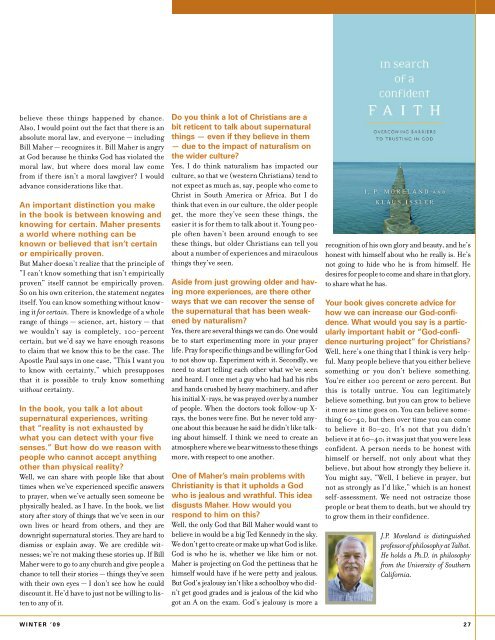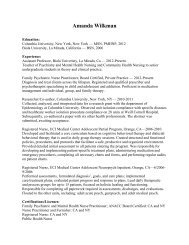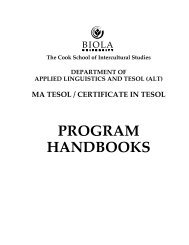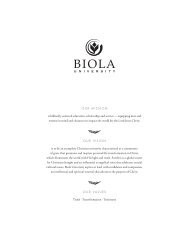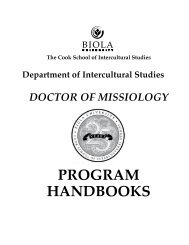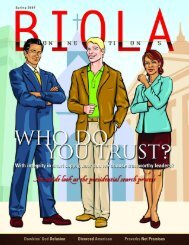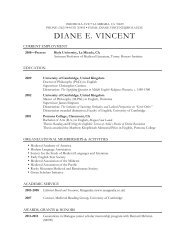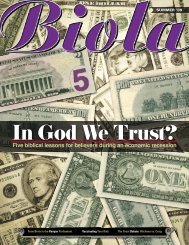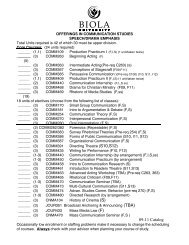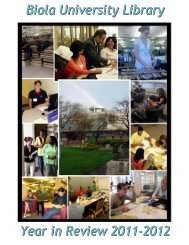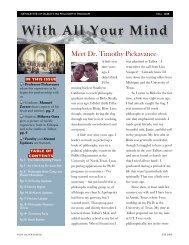Create successful ePaper yourself
Turn your PDF publications into a flip-book with our unique Google optimized e-Paper software.
elieve these things happened by chance.<br />
Also, I would point out the fact that there is an<br />
absolute moral law, and everyone — including<br />
Bill Maher — recognizes it. Bill Maher is angry<br />
at God because he thinks God has violated the<br />
moral law, but where does moral law come<br />
from if there isn’t a moral lawgiver? I would<br />
advance considerations like that.<br />
An important distinction you make<br />
in the book is between knowing and<br />
knowing for certain. Maher presents<br />
a world where nothing can be<br />
known or believed that isn’t certain<br />
or empirically proven.<br />
But Maher doesn’t realize that the principle of<br />
“I can’t know something that isn’t empirically<br />
proven” itself cannot be empirically proven.<br />
So on his own criterion, the statement negates<br />
itself. You can know something without knowing<br />
it for certain. There is knowledge of a whole<br />
range of things — science, art, history — that<br />
we wouldn’t say is completely, 100-percent<br />
certain, but we’d say we have enough reasons<br />
to claim that we know this to be the case. The<br />
Apostle Paul says in one case, “This I want you<br />
to know with certainty,” which presupposes<br />
that it is possible to truly know something<br />
without certainty.<br />
In the book, you talk a lot about<br />
supernatural experiences, writing<br />
that “reality is not exhausted by<br />
what you can detect with your five<br />
senses.” But how do we reason with<br />
people who cannot accept anything<br />
other than physical reality?<br />
Well, we can share with people like that about<br />
times when we’ve experienced specific answers<br />
to prayer, when we’ve actually seen someone be<br />
physically healed, as I have. In the book, we list<br />
story after story of things that we’ve seen in our<br />
own lives or heard from others, and they are<br />
downright supernatural stories. They are hard to<br />
dismiss or explain away. We are credible witnesses;<br />
we’re not making these stories up. If Bill<br />
Maher were to go to any church and give people a<br />
chance to tell their stories — things they’ve seen<br />
with their own eyes — I don’t see how he could<br />
discount it. He’d have to just not be willing to listen<br />
to any of it.<br />
Do you think a lot of Christians are a<br />
bit reticent to talk about supernatural<br />
things — even if they believe in them<br />
— due to the impact of naturalism on<br />
the wider culture?<br />
Yes, I do think naturalism has impacted our<br />
culture, so that we (western Christians) tend to<br />
not expect as much as, say, people who come to<br />
Christ in South America or Africa. But I do<br />
think that even in our culture, the older people<br />
get, the more they’ve seen these things, the<br />
easier it is for them to talk about it. Young people<br />
often haven’t been around enough to see<br />
these things, but older Christians can tell you<br />
about a number of experiences and miraculous<br />
things they’ve seen.<br />
Aside from just growing older and having<br />
more experiences, are there other<br />
ways that we can recover the sense of<br />
the supernatural that has been weakened<br />
by naturalism?<br />
Yes, there are several things we can do. One would<br />
be to start experimenting more in your prayer<br />
life. Pray for specific things and be willing for God<br />
to not show up. Experiment with it. Secondly, we<br />
need to start telling each other what we’ve seen<br />
and heard. I once met a guy who had had his ribs<br />
and hands crushed by heavy machinery, and after<br />
his initial X-rays, he was prayed over by a number<br />
of people. When the doctors took follow-up Xrays,<br />
the bones were fine. But he never told anyone<br />
about this because he said he didn’t like talking<br />
about himself. I think we need to create an<br />
atmosphere where we bear witness to these things<br />
more, with respect to one another.<br />
One of Maher’s main problems with<br />
Christianity is that it upholds a God<br />
who is jealous and wrathful. This idea<br />
disgusts Maher. How would you<br />
respond to him on this?<br />
Well, the only God that Bill Maher would want to<br />
believe in would be a big Ted Kennedy in the sky.<br />
We don’t get to create or make up what God is like.<br />
God is who he is, whether we like him or not.<br />
Maher is projecting on God the pettiness that he<br />
himself would have if he were petty and jealous.<br />
But God’s jealousy isn’t like a schoolboy who didn’t<br />
get good grades and is jealous of the kid who<br />
got an A on the exam. God’s jealousy is more a<br />
recognition of his own glory and beauty, and he’s<br />
honest with himself about who he really is. He’s<br />
not going to hide who he is from himself. He<br />
desires for people to come and share in that glory,<br />
to share what he has.<br />
Your book gives concrete advice for<br />
how we can increase our God-confidence.<br />
What would you say is a particularly<br />
important habit or “God-confidence<br />
nurturing project” for Christians?<br />
Well, here’s one thing that I think is very helpful.<br />
Many people believe that you either believe<br />
something or you don’t believe something.<br />
You’re either 100 percent or zero percent. But<br />
this is totally untrue. You can legitimately<br />
believe something, but you can grow to believe<br />
it more as time goes on. You can believe something<br />
60–40, but then over time you can come<br />
to believe it 80–20. It’s not that you didn’t<br />
believe it at 60–40; it was just that you were less<br />
confident. A person needs to be honest with<br />
himself or herself, not only about what they<br />
believe, but about how strongly they believe it.<br />
You might say, “Well, I believe in prayer, but<br />
not as strongly as I’d like,” which is an honest<br />
self-assessment. We need not ostracize those<br />
people or beat them to death, but we should try<br />
to grow them in their confidence.<br />
J.P. Moreland is distinguished<br />
professor of philosophy at Talbot.<br />
He holds a Ph.D. in philosophy<br />
from the <strong>University</strong> of Southern<br />
California.<br />
W I N T E R ’ 0 9 2 7


